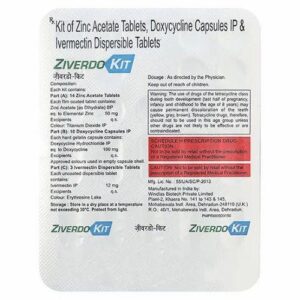DOXYCYCLINE + IVERMECTIN + ZINC ACETATE
Doxycycline: Doxycycline is a broad-spectrum antibiotic that belongs to the tetracycline class. It is commonly used to treat various bacterial infections such as respiratory tract infections, urinary tract infections, skin infections, and sexually transmitted diseases like chlamydia and gonorrhea. Moreover, it is also prescribed for the prevention of malaria and the treatment of acne.
Doxycycline works by inhibiting bacterial protein synthesis, thereby preventing the growth and spread of bacteria. It achieves this by binding to the bacterial ribosome and blocking the attachment of transfer RNA, halting the production of essential proteins required for bacterial survival.
The dosage of doxycycline can vary depending on the condition being treated. For most infections in adults, the initial dose is usually 200 mg on the first day, followed by a maintenance dose of 100 mg once daily or 50 mg twice daily. It is important to follow the prescribed dosage and duration of treatment recommended by the healthcare professional.
Like any medication, doxycycline may cause side effects. Common side effects include nausea, vomiting, diarrhea, abdominal pain, and loss of appetite. Other potential side effects include skin rash, sensitivity to sunlight leading to sunburn, vaginal yeast infections, and changes in the oral and vaginal microbiome. In rare cases, more serious side effects such as severe allergic reactions, liver damage, and kidney problems may occur.
Doxycycline should not be taken by pregnant women, as it can interfere with fetal development and cause permanent discoloration of the teeth in the unborn child. Additionally, it should be used with caution in individuals with liver or kidney disease.
It is recommended to take doxycycline with a full glass of water, and to avoid taking it with dairy products, antacids, or iron supplements, as these can reduce its effectiveness. It is also important to complete the full course of treatment, even if symptoms improve before the prescribed duration.
Ivermectin: Ivermectin is a medication that belongs to a class of drugs called antiparasitic agents. It is primarily used to treat infections caused by certain parasitic worms and mites.
The drug works by binding selectively and with high affinity to glutamate-gated chloride ion channels that are primarily found in invertebrate nerve and muscle cells. By binding to these channels, it causes an increase in the permeability of the cell membrane to chloride ions, leading to hyperpolarization and paralysis of the parasite. This ultimately results in the death or elimination of the parasite from the body.
Ivermectin is commonly used to treat conditions such as river blindness (onchocerciasis), strongyloidiasis, and scabies. It can also be used as a preventive treatment for individuals at high risk of these infections.
The dosage of ivermectin varies depending on the specific condition being treated. For example, for the treatment of scabies, a single oral dose of ivermectin is typically administered, whereas for the treatment of river blindness, multiple doses may be required over a certain period. The exact dosage should be determined by a healthcare professional based on factors such as the patient’s weight, age, and the severity of the infection.
As with any medication, ivermectin may cause side effects. Common side effects include dizziness, headache, nausea, vomiting, and diarrhea. These side effects are generally mild and resolve on their own. In rare cases, more severe side effects such as allergic reactions, rash, or neurological symptoms like seizures may occur, and immediate medical attention should be sought if these occur.
It is important to note that Ivermectin is primarily approved as an antiparasitic agent for animals and is also used in veterinary medicine. Its human use is approved for specific conditions, and it is crucial to follow the advice and prescriptions of healthcare professionals when using this medication.
Zinc Acetate: Zinc Acetate is a medication that contains zinc in the form of a salt. It is primarily used to treat and prevent zinc deficiency in the body. It is available as an oral supplement.
The mechanism of action of Zinc Acetate involves providing the body with sufficient levels of zinc. Zinc is an essential mineral that plays a crucial role in various biochemical processes in the body, including cellular metabolism, immune function, wound healing, and DNA synthesis. It functions as a co-factor for numerous enzymes and is necessary for the proper functioning of many biological processes.
The recommended dose of Zinc Acetate varies depending on the individual’s age, gender, and specific medical condition. It is typically taken orally, usually with food, to enhance absorption. Standard doses for zinc deficiency range from 25 to 50 mg per day. However, it is essential to follow the prescribed dosage from a healthcare professional.
As with any medication, Zinc Acetate may have some side effects. Common side effects include gastrointestinal disturbances, such as nausea, vomiting, diarrhea, and stomach cramps. These side effects can generally be minimized by taking the medication with food. In rare cases, individuals may experience allergic reactions or other severe adverse effects. It is important to consult a healthcare professional if any concerning side effects are experienced.
It is worth noting that excess intake of zinc can lead to toxicity and adverse effects. Chronic high-dose intake of zinc can interfere with the absorption and metabolism of other essential minerals, such as copper and iron. It is crucial to follow the recommended dosage and consult a healthcare professional before starting any new medication or supplement.
Overall, Zinc Acetate is a medication used to treat and prevent zinc deficiency. It works by replenishing the body’s zinc levels and supporting various biochemical processes. As with any medication, it is essential to use it under the guidance of a healthcare professional to ensure safe and effective usage.

